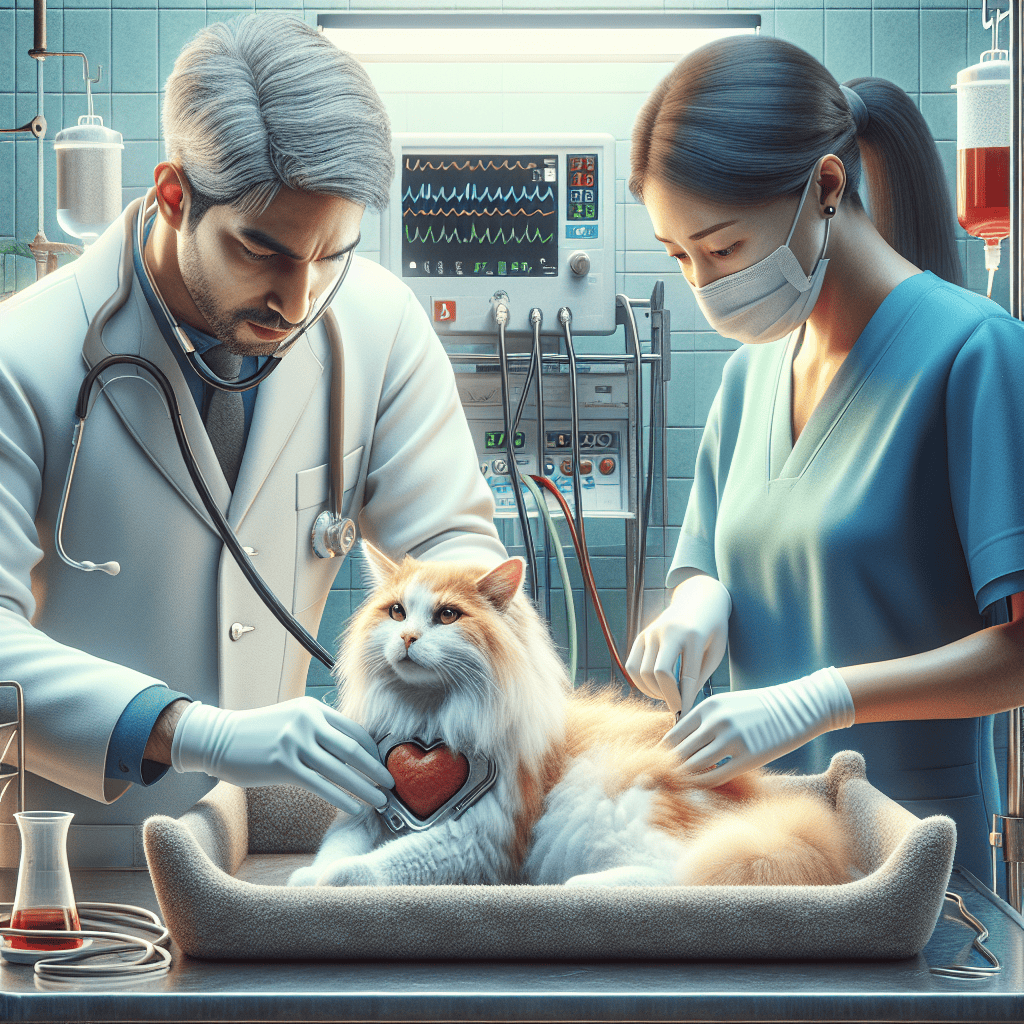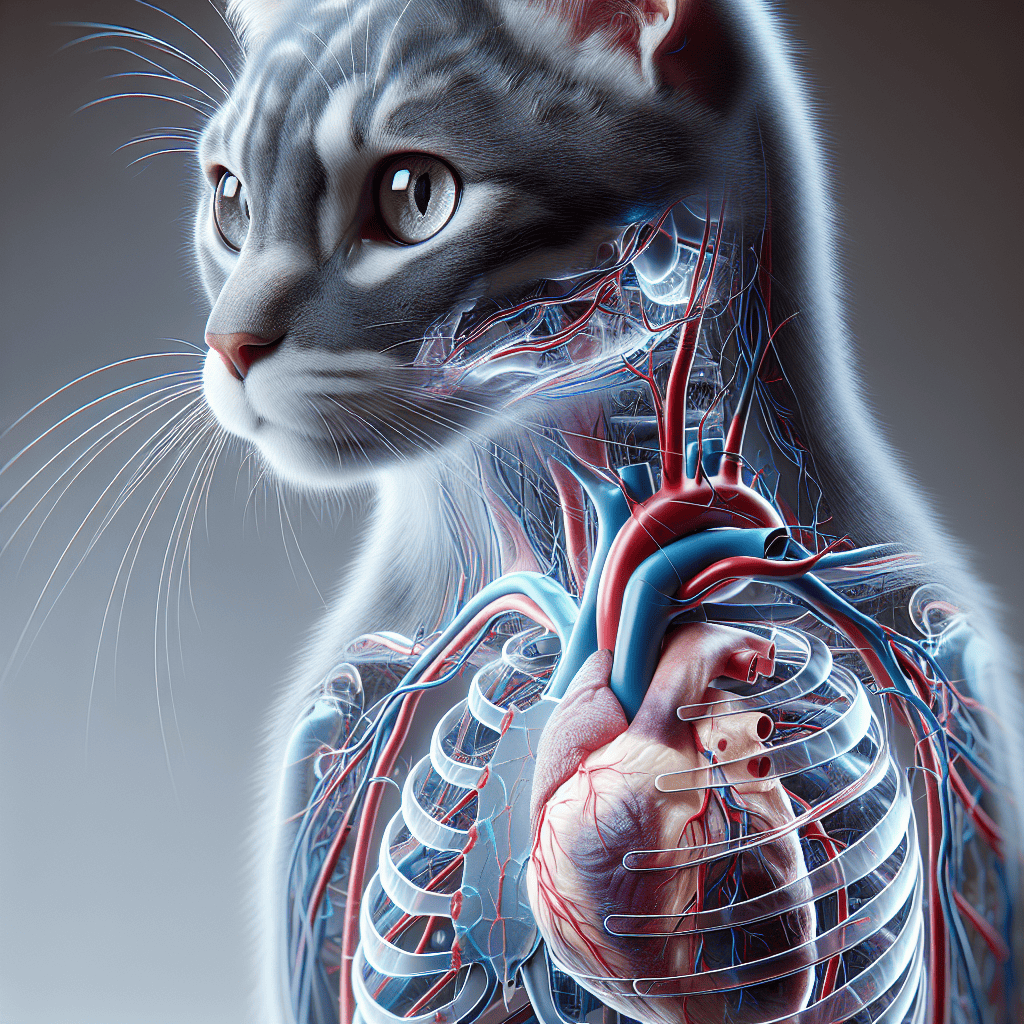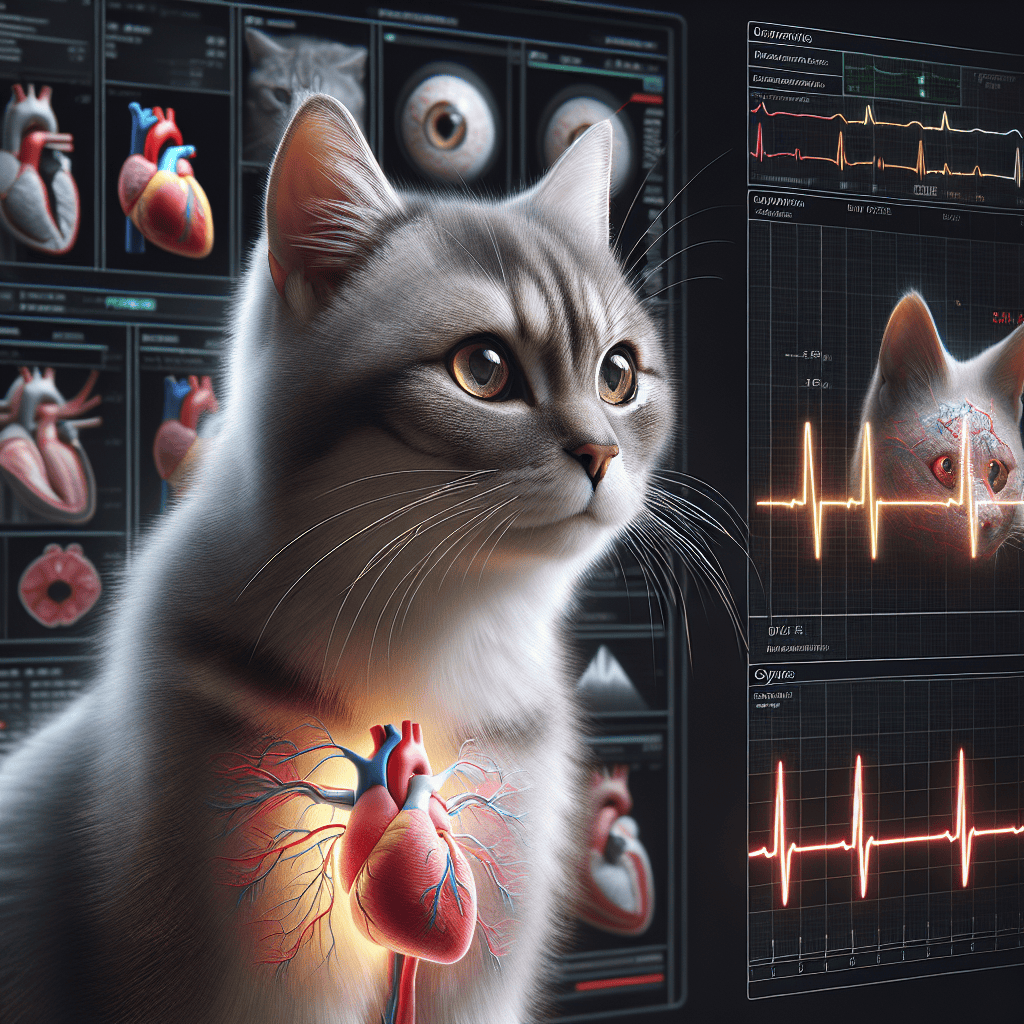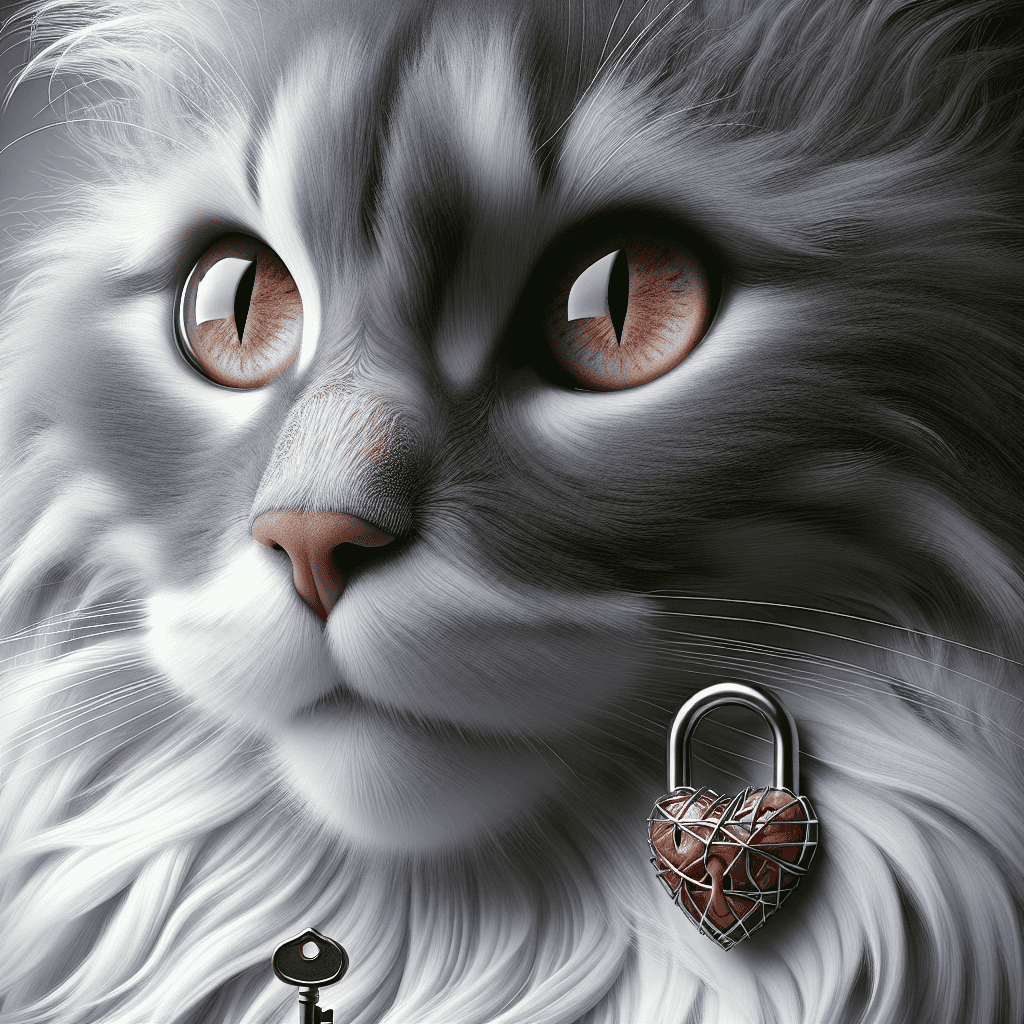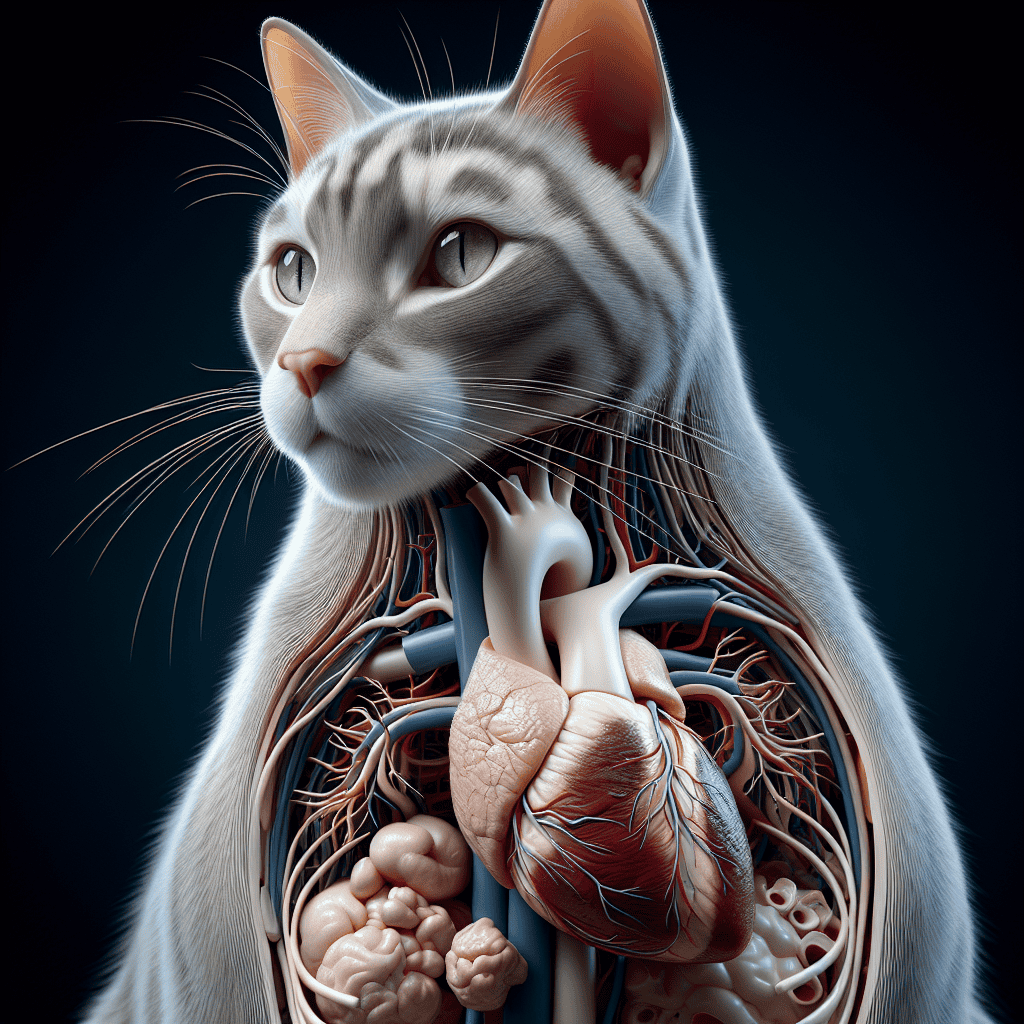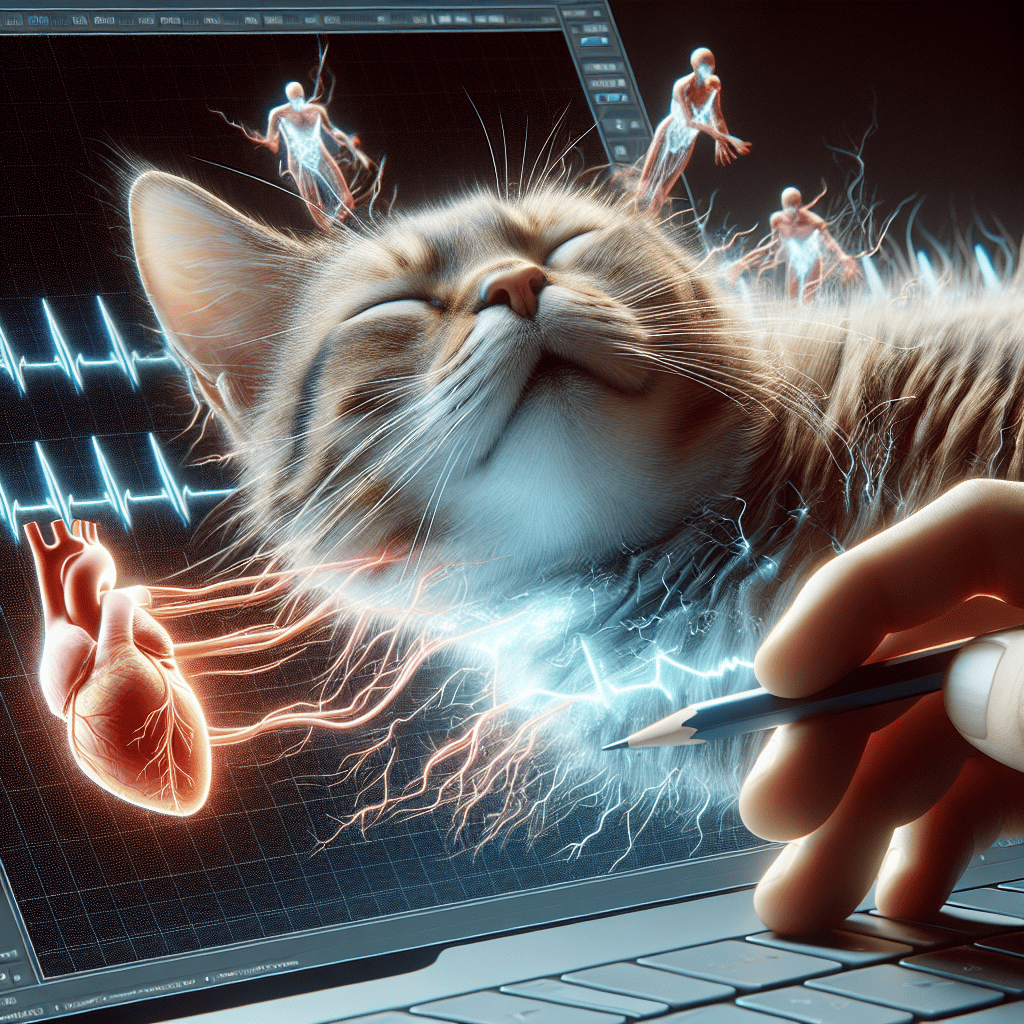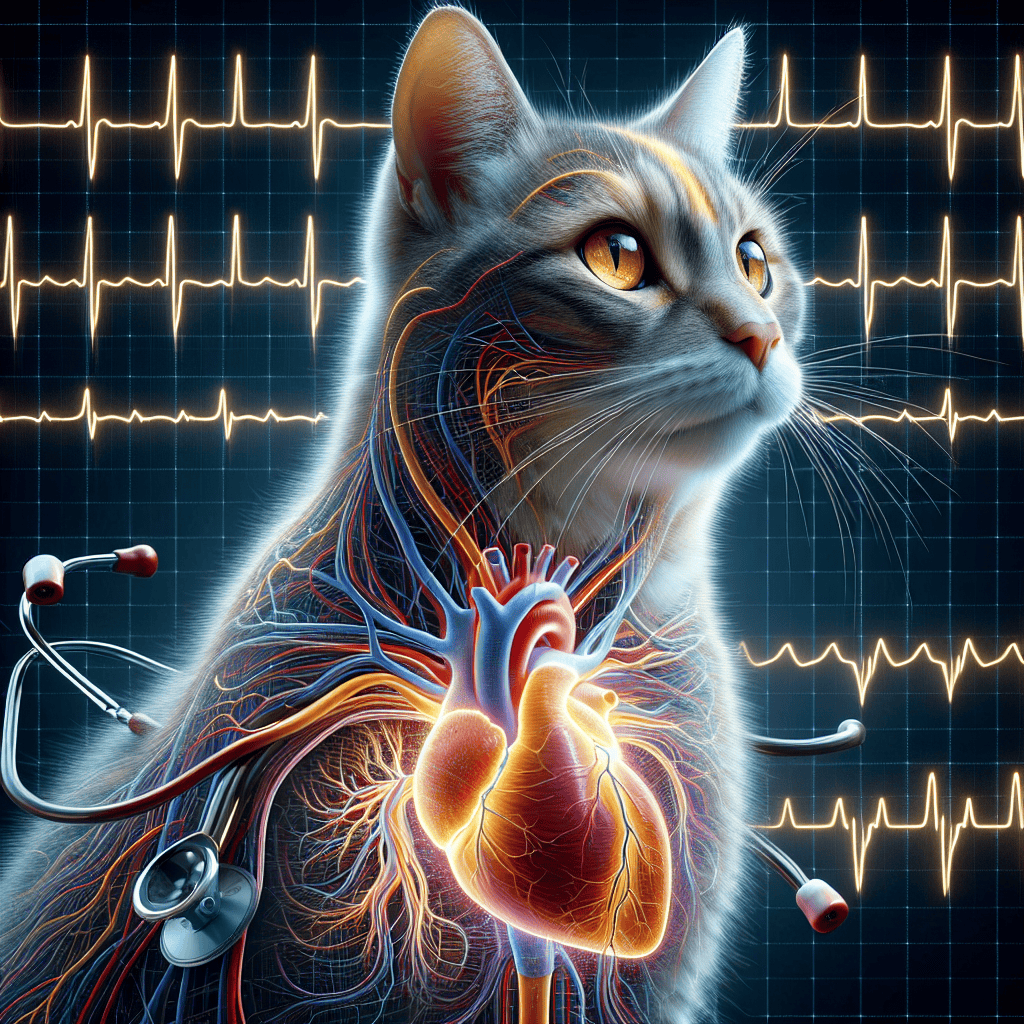Understanding Heart Block in Cats
Heart block in cats is a condition that affects the normal electrical conduction of the heart, leading to an abnormal rhythm and potentially compromising the heart’s ability to pump blood effectively. To gain a better understanding of this condition, it’s important to explore the types of heart block and the causes associated with it.
Types of Heart Block
Heart block in cats can be categorized into three types: first-degree heart block, second-degree heart block, and third-degree heart block. These types differ in terms of the extent of interference with the electrical signals that control the beating of the heart.
- First-degree heart block: In this type, there is a delay in the electrical signal as it passes through the heart’s conduction system. However, the signal still reaches the ventricles, resulting in a prolonged but otherwise normal heartbeat.
- Second-degree heart block: This type is further divided into two subtypes: Type 1 (Mobitz Type 1 or Wenckebach) and Type 2 (Mobitz Type 2). In Type 1, there is a gradual delay and occasional failure of the electrical signal to reach the ventricles. In Type 2, there is an intermittent and unpredictable failure of the signal.
- Third-degree heart block: Also known as complete heart block, this is the most severe type. In third-degree heart block, there is a complete blockage of the electrical signal from the atria to the ventricles. As a result, the ventricles beat at a slower rate than the atria, leading to a significantly compromised heart function.
Causes of Heart Block
Heart block in cats can have various causes, including congenital heart disease, cardiomyopathy, age-related changes, infections, toxins, trauma, and idiopathic reasons. Understanding the underlying cause is crucial in determining the appropriate treatment and management options.
Some common causes of heart block in cats include:
- Congenital heart disease: Cats may be born with certain structural abnormalities or defects in the heart’s conduction system that can lead to heart block.
- Cardiomyopathy: This refers to diseases that affect the heart muscle, causing it to become weak or thickened, which can disrupt the normal electrical conduction.
- Age-related changes: As cats age, their heart’s conduction system may undergo natural degenerative changes, potentially leading to heart block.
- Infections and toxins: Infections, such as feline infectious peritonitis (FIP), or exposure to certain toxins can damage the heart and interfere with its electrical conduction.
- Trauma: Physical trauma to the chest or heart can disrupt the heart’s conduction system, resulting in heart block.
- Idiopathic reasons: In some cases, the exact cause of heart block may remain unknown.
By understanding the types and causes of heart block in cats, pet owners can recognize the signs and symptoms early on and seek appropriate veterinary care. Prompt diagnosis and treatment are crucial in managing this condition effectively and improving the overall quality of life for affected feline companions.
Symptoms and Diagnosis
When it comes to diagnosing and identifying heart block in cats, recognizing the symptoms and conducting appropriate diagnostic procedures are crucial steps in providing effective treatment. Let’s explore these aspects in more detail.
Recognizing Symptoms
Symptoms of heart block in cats can vary depending on the severity and type of heart block. It is important for cat owners to be aware of potential signs that may indicate a heart block condition. Some common symptoms to watch out for include:
- Weakness and lethargy
- Fainting or collapsing episodes
- Difficulty breathing
- Intolerance during exercise
- Loss of appetite
- Coughing
- Blue-tinged gums or tongue
These symptoms may be indicative of a heart block in cats, but it’s important to note that they can also be associated with other health conditions. If you notice any of these symptoms in your cat, it is advisable to seek veterinary attention for a proper diagnosis and treatment plan. For more information on heart block symptoms in cats, visit our article on heart block symptoms in cats.
Diagnostic Procedures
Diagnosing heart block in cats involves a series of diagnostic procedures to assess the cat’s overall health and determine the presence and severity of the heart block condition. Veterinary professionals may recommend the following diagnostic procedures:
-
Physical examination: A thorough physical examination allows the veterinarian to assess the cat’s overall health and detect any abnormalities that may be associated with heart block.
-
Ventricular escape rhythm ECG: An electrocardiogram (ECG) is used to measure the electrical activity of the heart. A ventricular escape rhythm ECG helps determine the type and severity of the heart block.
-
Echocardiogram: An echocardiogram uses ultrasound technology to visualize the structure and function of the heart. This procedure can help identify underlying causes of the heart block and assess the overall condition of the heart.
-
Blood testing: Blood tests may be conducted to evaluate the cat’s overall health and check for any underlying medical conditions that may contribute to or be associated with heart block.
-
X-rays: X-rays can provide additional information about the heart’s structure and assess the size and shape of the heart.
-
Holter monitoring: In some cases, a Holter monitor may be used to monitor the cat’s heart rhythm over a period of time, usually 24 to 48 hours. This can help detect any irregularities or abnormalities that may not be captured during a short-term ECG.
By conducting these diagnostic procedures, veterinarians can accurately diagnose heart block in cats and determine the best course of treatment. It is crucial to consult a veterinarian experienced in diagnosing and treating feline heart block to ensure proper evaluation and care.
In the next section, we will explore the various treatment options available for managing heart block in cats.
Treatment Options
When it comes to treating heart block in cats, there are several options available to manage this condition. The choice of treatment depends on the severity of the heart block and the specific needs of the individual cat. The two primary treatment options for heart block in cats are medication management and pacemaker implantation.
Medication Management
In some cases, medication can be used to manage the symptoms associated with heart block in cats. However, it’s important to note that drug therapy for heart block in cats has not been firmly established. Medications may be prescribed to regulate the heart rate, improve cardiac function, or address underlying conditions that contribute to the heart block. The specific medications and dosages will be determined by a veterinarian based on the cat’s individual needs.
It’s essential to closely monitor cats undergoing medication management for heart block. Regular veterinary check-ups and follow-up appointments are necessary to assess the cat’s response to the medications and make any necessary adjustments to the treatment plan.
Pacemaker Implantation
For cats with symptomatic third-degree or high-grade heart block, pacemaker implantation is often the preferred treatment option. Pacemakers are specialized devices that help to resolve electrical impulse conduction problems in the heart and normalize its beating. In the case of complete heart block, pacemakers are used to clear the blockage of electrical impulses at the atrioventricular (AV) node (PetMD).
Pacemaker implantation is a highly invasive procedure and is rarely reported in the literature for cats (PubMed Central). However, it is considered the most effective treatment for symptomatic third-degree or high-grade heart block. This procedure involves the surgical placement of a pacemaker device, which sends electrical impulses to the heart, ensuring regular and coordinated contractions.
It’s important to consult with a veterinary cardiologist to determine if pacemaker implantation is appropriate for a cat with heart block. The decision will be based on the cat’s overall health, the severity of the heart block, and the potential benefits and risks of the procedure.
By considering both medication management and pacemaker implantation, veterinarians can tailor the treatment approach to meet the specific needs of each cat with heart block. Regular monitoring and follow-up visits with a veterinarian are essential to ensure that the chosen treatment option is effective and to make any necessary adjustments to the treatment plan. Remember to consult with a veterinarian who has experience in managing feline heart block to provide the best possible care for your furry friend.
Case Study: Cilostazol Treatment
In the quest to find effective treatments for heart block in cats, a case study involving the use of cilostazol has shown promising results. Cilostazol, an antiplatelet aggregation agent with phosphodiesterase type-3 inhibitory effects, has been used in human patients with advanced AV block before pacemaker implantation or in cases where pacemaker implantation is not possible (NCBI).
Efficacy of Cilostazol
The case study involved a 12-year-old neutered female domestic shorthair cat with high-grade atrioventricular (AV) block. The AV block was related to fibrosis of the impulse conduction system, as revealed by histopathological examination of the cat’s heart. The cat was treated with cilostazol, and the effects were observed over a period of 650 days without the need for pacemaker implantation.
Cilostazol was chosen due to its phosphodiesterase type-3 inhibitory effects, which can increase heart rate in patients with bradyarrhythmia. By improving heart rate, cilostazol aims to address the bradycardia associated with AV block, thereby potentially improving the overall condition of the cat.
Clinical Outcomes
During the treatment period, the cat showed improvements in clinical signs and did not experience any syncope after day 403 of treatment. This suggests that cilostazol played a role in stabilizing the heart rhythm and reducing symptoms associated with AV block.
However, it is important to note that after day 650, the cat’s condition progressed to complete AV block, leading to its unfortunate demise. While cilostazol showed efficacy in managing the AV block for an extended period, it ultimately was unable to prevent the progression of the condition in this particular case.
This case study highlights the potential of cilostazol as a treatment option for cats with high-grade AV block. However, it is important to consult with a veterinarian to determine the suitability of cilostazol for individual cats and to closely monitor the cat’s response to treatment. Pacemaker implantation may still be necessary in certain cases, and the long-term prognosis for cats with AV block remains a subject of ongoing research (feline heart block prognosis).
In the search for effective treatments for heart block in cats, ongoing research and advancements in veterinary medicine continue to provide hope for improving the quality of life for feline patients.
Complications and Considerations
When it comes to treating feline heart block, it’s important to be aware of potential complications and considerations that may arise during the treatment process. Understanding these aspects can help cat owners make informed decisions and provide the necessary care for their feline companions.
Potential Complications
Treatment for heart block, such as pacemaker implantation, may involve some potential complications. These can include side effects such as infection, bleeding, or bruising at the site of insertion (Cleveland Clinic). It is important to monitor the incision site for any signs of infection, and consult with a veterinarian if there are any concerns.
In severe cases, untreated heart block can lead to sudden cardiac arrest (Cleveland Clinic). However, with proper treatment and management, the prognosis for cats with heart block can be favorable. Regular check-ups and monitoring are essential to ensure the ongoing health of the cat’s heart.
Long-Term Care
After receiving treatment for heart block, cats may require long-term care to maintain their well-being. This includes regular visits to the veterinarian for check-ups and monitoring of the pacemaker function. It is important to follow the veterinarian’s recommendations regarding medication, lifestyle adjustments, and any necessary follow-up procedures.
Recovery time after pacemaker implantation may involve staying overnight in the hospital and returning to regular activities within a few days to weeks post-surgery (Cleveland Clinic). The veterinarian will provide specific instructions for post-operative care and activity restrictions to ensure proper healing.
In addition to medical care, providing a supportive and stress-free environment for the cat is crucial for their overall well-being. Minimizing exposure to stressful situations and maintaining a consistent routine can help reduce anxiety and promote a healthier heart.
Regular communication with the veterinarian is essential to address any concerns or changes in the cat’s health. They can provide guidance on managing potential complications and offer tailored advice on the specific needs of the cat.
By being aware of potential complications and providing appropriate long-term care, cat owners can help ensure the best possible outcome for their feline friends with heart block. Regular veterinary care, adherence to treatment plans, and a loving environment can greatly contribute to the overall quality of life for cats living with this condition.
Preventive Measures
Preventing heart block in cats is essential for maintaining their overall health and well-being. By managing risk factors and adopting a healthy lifestyle, you can reduce the likelihood of heart block development in your feline companion.
Risk Factors
Understanding the risk factors associated with heart block can help you take proactive measures to minimize the chances of its occurrence. Some common risk factors for heart block in cats include:
-
Genetic Predisposition: Certain breeds may have a higher risk of developing heart block. It’s important to be aware of any breed-specific predispositions and discuss them with your veterinarian.
-
Heart Disease: Cats with pre-existing heart conditions, such as hypertrophic cardiomyopathy, are at an increased risk of developing heart block. Regular veterinary check-ups and appropriate management of underlying heart conditions are crucial.
-
Autoimmune Diseases: Some autoimmune diseases, such as systemic lupus erythematosus, can increase the risk of heart block in both humans and animals. If your cat has an autoimmune disease, work closely with your veterinarian to monitor their heart health.
-
Medication Side Effects: Certain medications, such as those used to treat arrhythmias, may have the potential to cause heart block. It’s important to follow your veterinarian’s instructions carefully and report any unusual symptoms or concerns.
By being aware of these risk factors, you can work with your veterinarian to develop a preventive plan tailored to your cat’s specific needs.
Lifestyle Recommendations
Maintaining a healthy lifestyle is key to preventing heart block in cats. Here are some lifestyle recommendations that can help reduce the risk:
-
Regular Exercise: Encourage regular exercise and playtime to keep your cat active and maintain a healthy weight. Engaging in physical activity can promote cardiovascular health and overall well-being.
-
Balanced Diet: Provide a well-balanced, nutritious diet that meets your cat’s specific dietary needs. Consult with your veterinarian to determine the appropriate diet for your cat’s age, breed, and any existing health conditions.
-
No Smoking: Avoid exposing your cat to secondhand smoke, as it can have detrimental effects on their cardiovascular health. Smoking can contribute to the development of heart disease and increase the risk of heart block.
-
Regular Veterinary Check-ups: Schedule routine check-ups with your veterinarian to monitor your cat’s heart health. Regular examinations, along with any necessary diagnostic tests, can help detect any early signs of heart block or other cardiac conditions.
-
Stress Management: Minimize stressors in your cat’s environment and provide a calm and comfortable living space. Stress can negatively impact cardiac health, so creating a stress-free environment is beneficial.
By implementing these preventive measures, you can significantly reduce the risk of heart block in your cat. Remember, if you observe any heart block symptoms in cats, seek immediate veterinary attention for proper diagnosis and treatment.






